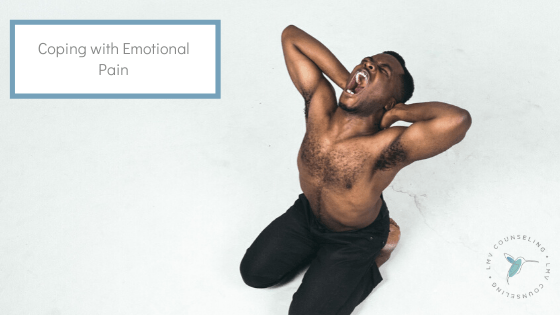Coping with Emotional Pain: Practical Tools for Healing
Emotional pain can be incredibly overwhelming. Whether it stems from heartbreak, grief, trauma, or life’s unexpected curveballs, we all experience moments when coping feels nearly impossible. At LMV Counseling, we want you to know that you’re not alone—and that it’s possible to feel better. This guide is here to offer support when emotional pain feels like too much to carry on your own.
What Causes Emotional Pain?
Emotional pain can come from many life experiences, such as:
- The loss of a loved one
- A breakup or divorce
- Trauma or abuse
- Rejection or abandonment
- Sudden life changes or transitions
- Moving to a new place without support
- Struggling with substance use despite efforts to change
- Deep feelings of shame or self-hate
These experiences can make it hard to stay emotionally stable. You might think, “This is all in my head—I should be able to handle it.” But emotional pain often shows up as physical pain. It can affect your thoughts, your energy, and your ability to focus. Sometimes your mind races to make sense of everything. Other times, you may feel like you’re walking through fog. Both responses are natural—and valid.
Still, emotional pain doesn’t always show up at the best time. You might find yourself fighting back tears at the grocery store or experiencing a panic attack in the middle of a work meeting. In moments like these, it helps to have strategies to ground yourself, shift your focus, and return to the basics of self-car
Strategies to Cope
Grounding: Reconnect with the Present Moment
Grounding is a powerful tool to help bring your attention back to the present. When emotional pain pulls you out of the here-and-now, grounding offers a sense of safety and control. It can be as simple as connecting with the sensations of your body.
Grounding techniques to try:
- Sit in a chair and notice the pressure beneath you.
- Walk slowly and pay attention to how your feet hit the ground.
- Let water run over your hands and notice the temperature and texture.
- Lie down and feel the sensation of a pillow under your head.
A quick grounding exercise:
- Sit or stand comfortably.
- Notice how your body is supported. Pay attention to how your feet or back make contact with the surface.
- Identify areas in your body that feel neutral or relaxed.
- If you’re distracted, play a mental game—like naming everything you see that’s blue. This shifts your focus to the present.
Distraction: Give Your Mind a Break
When emotions feel too heavy, distraction can help create a temporary pause. That break can make space for healing to begin. Remember: it’s okay to take a mental breather. Just make sure to return to the feelings later when you’re more prepared to process them.
Healthy distraction ideas:
- Watch a TV show or movie that grabs your attention
- Go for a walk or jog—movement can ease racing thoughts
- Punch a pillow or use a punching bag
- Eat a crunchy snack or something that takes time to prepare
- Listen to loud, engaging music
- Sing a song that’s likely to get stuck in your head
- Play with a pet or visit a dog park
- Look through photos that make you smile
- Take care of something small, like a plant
- Try guided imagery or nature sounds
- Take a hot shower or use an ice pack to change your temperature
Avoid alcohol or drugs if possible, as they can increase emotional intensity, especially after the effects wear off.
Back to Basics: When You’re in Survival Mode
 Sometimes emotional pain makes everything feel impossible. That’s when it’s time to focus only on the essentials.
Sometimes emotional pain makes everything feel impossible. That’s when it’s time to focus only on the essentials.
Ask yourself:
- Have I eaten today?
- Did I get any sleep?
- Have I showered or used the restroom?
These may seem like small tasks, but they’re vital steps in caring for yourself during distress. Give yourself permission to cancel plans, rest, and recover. Just like you would take time off to heal a physical injury, emotional pain deserves the same compassion and care.
If you’ve been giving yourself space and still aren’t finding relief, it might be time to seek extra support.
Ask for Support: You Don’t Have to Do This Alone
Reach out to a loved one or professional support for assistance. It is lonely and challenging to shoulder the burden of emotional pain on your own.Be open with your supports about what you’re feeling and what you need.
Should you decide professional support is important for you, we recommend finding a trained therapist to walk with you in this difficult time. Our therapists at LMV Counseling are here to walk with you through the pain. We know how hard it can be to reach out when you’re struggling, but we’re ready to meet you where you are—with empathy, expertise, and care. Whether you’re navigating grief, trauma, anxiety, or depression, we’re here to support you. Go ahead—get started now. Taking that first step might be hard, but it’s also one of the most powerful choices you can make for yourself.
Frequently Asked Questions
1. Is it normal to feel physical pain from emotional distress? Yes. Emotional pain can cause muscle tension, headaches, stomach issues, and more. Your mind and body are deeply connected.
2. What if grounding or distraction doesn’t help? Try different techniques to see what works best for you. If your symptoms persist, a therapist can help you find coping tools tailored to your needs.
3. How do I know if I need therapy? If emotional pain is interfering with your ability to function or feel joy, it’s a good idea to talk to a professional. Therapy provides a safe space for healing.
4. What kind of therapy does LMV Counseling offer? We offer therapy for anxiety, depression, trauma, substance use, life transitions, and more—including innovative treatments like ketamine-assisted therapy.
5. How do I get started with a therapist at LMV Counseling? It’s easy. Just contact us or fill out our intake form. Our client care coordinator will match you with a therapist who fits your needs and schedule.
Let’s walk through this together. You deserve relief—and we’re here to help you find it.


